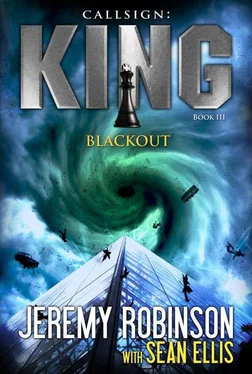Jeremy Robinson - Blackout
Здесь есть возможность читать онлайн «Jeremy Robinson - Blackout» весь текст электронной книги совершенно бесплатно (целиком полную версию без сокращений). В некоторых случаях можно слушать аудио, скачать через торрент в формате fb2 и присутствует краткое содержание. Жанр: Триллер, на английском языке. Описание произведения, (предисловие) а так же отзывы посетителей доступны на портале библиотеки ЛибКат.
- Название:Blackout
- Автор:
- Жанр:
- Год:неизвестен
- ISBN:нет данных
- Рейтинг книги:4 / 5. Голосов: 1
-
Избранное:Добавить в избранное
- Отзывы:
-
Ваша оценка:
- 80
- 1
- 2
- 3
- 4
- 5
Blackout: краткое содержание, описание и аннотация
Предлагаем к чтению аннотацию, описание, краткое содержание или предисловие (зависит от того, что написал сам автор книги «Blackout»). Если вы не нашли необходимую информацию о книге — напишите в комментариях, мы постараемся отыскать её.
Blackout — читать онлайн бесплатно полную книгу (весь текст) целиком
Ниже представлен текст книги, разбитый по страницам. Система сохранения места последней прочитанной страницы, позволяет с удобством читать онлайн бесплатно книгу «Blackout», без необходимости каждый раз заново искать на чём Вы остановились. Поставьте закладку, и сможете в любой момент перейти на страницу, на которой закончили чтение.
Интервал:
Закладка:
“Fi?”
Fiona shook her head, breaking eye contact with the relic box, and the feeling receded. “No, he’s not here.”
“Let’s try the Da Vinci sketches, next.” Sara seemed not to have noticed the girl’s fascination with the reliquary. “That’s the kind of thing Diotrophes would be interested in, right?”
Fiona nodded dumbly and followed along, but she now kept her gaze on the floor, purposefully resisting the urge to visually take in her surroundings. She was only peripherally aware of the route Sara navigated, and in the back of her mind, it occurred to her that if they became separated, she wouldn’t have a clue how to find her way out. A few moments later, Sara stopped and Fiona looked up to see another gallery awaiting their inspection.
The large room was a veritable maze of freestanding display cases, each containing pages of vellum, adorned with delicate script and what looked like pencil sketches. Above the cases were enlarged reproductions of select images, the subjects ranging from detailed human figures to elaborate machines, and not a few bizarre creatures that looked to Fiona like they might contain hidden figures in the illustrated folds of skin and fur-like something from a child’s Find It puzzle. Fiona experienced a mixture of relief and disappointment as she gazed at the enormous prints; they did not produce the reaction she had felt in the other gallery.
And then her eyes fell on the original sketches.
She barely heard Sara say: “I don’t see him here, do you?”
Fiona worked her mouth, trying to form the question that had bubbled into her head but it was an effort. “Sara, you know your sensory whatever-it-is? How you can ‘see’ smells and stuff?”
Sara Fogg had been diagnosed with Sensory Processing Disorder; her sensory neural pathways didn’t always function the way they should, causing her to experience stimuli in unpredictable ways-to ‘smell’ colors or feel twinges of pain when seeing certain objects. Fiona had heard Sara and King talk about it from time to time, but she didn’t really understand the details.
“Sure.” A note of concern haunted Sara’s answer.
“Is it contagious?” Fiona pressed.
“Absolutely not. Fi, what’s wrong?”
Fiona gazed at the Da Vinci sketches, her eyes flitting back and forth as if trying to take all of them in all at once. The drawn images seemed to burst off the parchment and the carefully scripted notes glittered like magical runes in a Tolkien novel, imparting mystical knowledge that she could not read, but somehow intimately understood.
“I think I must have it too,” she said after a breathless moment. “Because these pictures are singing to me.”
10
Despite his stylish dinner jacket and immaculately coiffed silver hair, Graham Brown seemed no less banal a personage than he had in his first and only other encounter with King, in the remote Algerian villa where Sara Fogg had briefly been held prisoner.
Brown waited for the applause to die down before lifting the microphone and addressing the crowd. “Is everyone having fun spending my money?” he quipped, triggering a symphony of cackles and guffaws, and another round of clapping.
“Seriously folks,” he continued, sounding to King’s ear like a cut-rate stand-up comedian, “I don’t want to keep you from the festivities, but I just wanted to take this opportunity to thank you all for traveling here, from every corner of the globe, to take part in our little symposium.
“Power. It’s the reason we’re all here. And I’m not just talking about electrical energy. In times past, human society hungered for literal food, but now our greatest need is for the energy to drive our machines and our electrical devices. We have become entirely dependent on technology, and if the energy supply that makes it function were to be interrupted, it would be a disaster far worse than any famine or drought. Power, real power, belongs to those who can control the energy supply. And you, my friends, have that power.”
King listened attentively as Brown seemed on the verge of launching into a megalomaniacal diatribe, and he noticed others in the crowd murmuring uncomfortably.
“Or perhaps to put it more accurately,” Brown continued, softening his rhetoric. “You are the faithful stewards of that power. Society has entrusted the care and protection of its future to you, but make no mistake: it is a great responsibility. The power, of which I speak, does not rest with any one of us, nor with any man, nation or corporation. Nevertheless, it is something unscrupulous men might desire, and that is where we are vulnerable.
“I organized the Global Energy Future conference to call attention to this vulnerability. Our stewardship requires that we protect our trust-this great and potentially terrible power-from those who might seek to seize control for some dark purpose. As you are all doubtless aware, much of our power grid relies on early 20 ^ th century technology. The transmission of electricity through copper wires, for example, where ninety-nine percent of the energy is lost to resistance. The use of decades old computer systems for managing the grid. These are but two examples of challenges we must address if we are to meet the needs of the future.
“What we have done here this past week is merely to state the nature of the problem, but I’d like to think that we have also explored some possible solutions. Many of the technologies we’ve showcased are still in the conceptual phase. Others are presently too expensive to meet the demands of economic efficiency. Nevertheless, we must be willing to take some risks.
“It’s no coincidence that I have chosen to close the week’s activities with this casino event. Gambling is the perfect metaphor for the challenge we face. Will we play it safe? Stand on seventeen? Or will we take bold risks, losing sometimes, but in the end, winning the jackpot?
“I hope you will consider this metaphor as you return to your homes and your jobs. The safe bet, the status quo, is a slow path to failure. And the stakes are very high, my friends.”
Brown lowered the microphone, and on cue, the gathering clapped again, but this time the applause was more subdued, respectful rather than enthusiastic. The host however was not quite finished.
“Now, as a way of repaying you for having to suffer through my little speech, I have a little surprise.” Brown looked offstage and nodded to one of the stewards. “As I mentioned, there are some fantastic new technologies that aren’t quite ready for widespread distribution, but one of them is now ready for some real world field testing.”
As he spoke, a line of stewards trekked onto the stage and hastily deployed a folding table, upon which they deposited two elegant, covered, silver serving trays. When they had finished, Brown stepped behind the table and took a piece of paper from his pocket. “Would the following men please join me on stage?”
King’s curious musings about the contents of the serving trays were interrupted when he heard Brown speak the name of the man whose face he now wore. After overcoming his surprise and dismay, he jolted into motion.
As he moved onto the stage, King’s thumb brushed the ring on his third finger of his right hand, spinning the band around so that its decorative face was toward his palm. The ring, a Cold War-era spy gadget on loan from the CIA-probably from their museum-concealed the poison-tipped needle that would, if all went according to plan, take Brown permanently out of circulation. A gentle tap on the jeweled head-the pressure of a handshake or a squeezing grasp on the upper biceps, perhaps the result of an attempt to arrest a feigned stumble-would thrust the spring-loaded needle into its target.
Читать дальшеИнтервал:
Закладка:
Похожие книги на «Blackout»
Представляем Вашему вниманию похожие книги на «Blackout» списком для выбора. Мы отобрали схожую по названию и смыслу литературу в надежде предоставить читателям больше вариантов отыскать новые, интересные, ещё непрочитанные произведения.
Обсуждение, отзывы о книге «Blackout» и просто собственные мнения читателей. Оставьте ваши комментарии, напишите, что Вы думаете о произведении, его смысле или главных героях. Укажите что конкретно понравилось, а что нет, и почему Вы так считаете.












